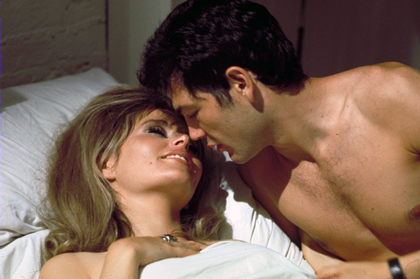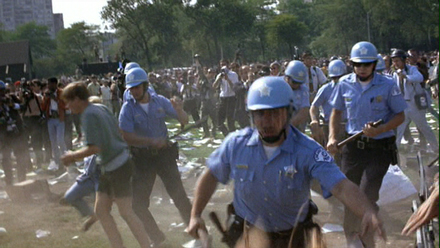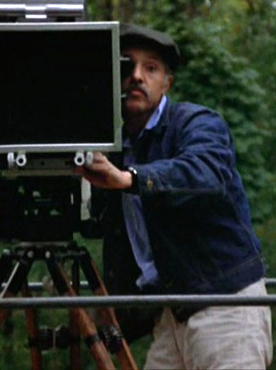
 |
|
|
|
Some new thinking must have prevailed in 1968 when cinematographer and documentary maker Haskell Wexler began shooting a film about an underprivileged child's relationship with an animal. Paramount stayed with the project even after Wexler radically redirected it to focus on national political events that were heating up that summer. Scripted drama and documentary realism never merged so fully as in Medium Cool, in which America appears to be coming apart at the political seams. Wexler and his co-cameramen did more than just film the ill-fated Democratic Convention in Chicago, showing clashes between demonstrators and Mayor Daley's police. He also managed to put his fictional characters into real situations within the demonstrations as they developed. The protest taunt, "The whole world is watching!" becomes part of the fabric of Wexler's story, as does a frightening moment when the police fire a tear gas canister at the cameraman. "Look out Haskell, it's real!" is heard on the soundtrack, echoing the film's examination of the role played by journalists with cameras. 
If anything, Medium Cool communicates its ideas better now than it did in 1969. Unlike many an avowed counterculture epic of the day, the arguments, techniques, and ethics of this amazing picture haven't dated. The production had contact within the anti-war movement and expected at least a token demonstration to occur at the Convention. But Wexler could not have predicted that his 'fictional' movie would record how a street demonstration became a police riot. In Chicago, we see roving TV cameraman / reporter John Cassellis (Robert Forster) and his sound man Gus (Peter Bonerz) dispassionately covering various news events, including a fatal traffic accident. But John is fired for taking an improper interest in the subjects he films, and for protesting that his superiors are forwarding his news film to the FBI. Leaving his nurse girlfriend Ruth (Marianna Hill), John becomes involved with Appalachian transplants Eileen and Harold (Verna Bloom & Harold Blankenship), a mother and her young son new to the Chicago slums. John attaches himself to a docu crew covering the Democratic National Convention, just as Eileen takes to the streets to search for the runaway Harold ... right in the middle of the unpredictably dangerous anti-war demonstrations. The title Medium Cool evokes philosopher Marshall McLuhan's theories about 'hot' and 'cool' media. In one of Criterion's new interviews, Haskell Wexler claims that he had no understanding of McLuhan whatsoever. He did have his own instincts about the way Television news was distorting reality by its choice of subjects. Important stories were underreported or actually suppressed. The media'a 'blind spot' for anti-war activism made the TV coverage of the Democratic Convention a big wake-up call for the nation. "The whole world" was indeed watching when CBS correspondent Dan Rather was roughed up by Mayor Daley's thugs on the convention floor, and when the TV cameras documented police attacking and beating non-violent demonstrators. Later commentators like David Halberstam would identify this clash as the moment that the Vietnam War was lost. Haskell was able to take his cameras into Chicago's ghetto neighborhoods only through the intervention of the respected journalist Studs Terkel, who secured the cooperation of the black residents. Minority views are heard that were not being permitted in the 'legitimate' media of 1969. The fictional part of the story raises the subject of Appalachian refugees in the big city. Young Harold, a real slum kid recruited on the street, was filmed adapting to his harsh urban environment in a way that allowed him to act in as natural a way as possible. Additional scenes involving a social worker were shot but eventually dropped. When his cameras captured the demonstration clash of the decade, Medium Cool underwent yet another major revision. 
As early as January 1968, before the terrible assassinations of that fated year, Wexler and co. were planning scenes to take place amid an anticipated clash in Chicago. Like the 'summer of love' that had been willed into being the year before in San Francisco, the word on the street predicted that it was 'all going to come down' in Chicago at the Convention. The anti-war movement was still a grassroots protest thing and not yet the media circus it later became, with hippies and yippies and Nixon's counterattack and fatuous pop songs issuing calls to revolution. Jesse Jackson is one of the speakers seen in a brief Washington, D.C. segment. We see a protesters' tent camp erected in sight of the Washington Monument. Wexler and company were permitted to film the Illinois National Guard's urban crowd control training for the Convention, indicating that the authorities knew something was coming as well. The film presents the Guard as relatively benign, and saves its contempt for Mayor Daley, who directed his police force to teach the longhaired flag-burners a lesson they wouldn't forget. In his commentary Haskell Wexler says that the cops' only mistake in '68 was in using their thug methods on the press -- beating reporters, etc.. The media turned against Daley, the cops, Nixon and the war right then and there. Beyond its phenomenal footage of the demonstration, Medium Cool has many scenes sure to provoke discussion. The media's lack of responsibility is examined in an argument between Ruth and John about the Italian film Mondo Cane. That phony docu exploited the suffering of an irradiated sea turtle dying on an island reportedly used for atomic tests. Should the Italian filmmakers have rescued the turtle when they were done filming, or would that have been a violation of their role as objective observers? John doesn't mention his own behavior filming a shocking traffic accident on an empty road. Happening upon the scene before the police or ambulances arrive, John and Gus get their film footage and then move on to their next story without offering aid. Elsewhere Wexler draws a contrast between a rich woman behaving in an elitist manner and the kind of urban slum where kids play naked in the street and teens vandalize cars. Some scenes are obviously scripted, as when a very young Peter Boyle is shown teaching suburban women how to use firearms. But everything with the National Guard is real. 
Haskell Wexler's skill as a dramatist rarely surfaces in discussions of Medium Cool. His direction of the little slum kid is gentle and perceptive, and professional actress Verna Bloom comes off as an authentic West Virginian. Some full-frontal nudity in a scene between Forster and Marianna Hill may have earned the film its original "X" rating (although it has since been downgraded to an "R"). The frequent profanity may have been deemed adult material as well. Wexler's final shot is blatantly self-conscious, yet falls in with the 'new documentary' notion that films need to be honest about their own artifice. The message comes across loud and clear: 'The whole world is watching!' Criterion's Blu-ray of Medium Cool looks terrific in HD, with Wexler's handheld 35mm footage of the Chicago demonstrations looking so good that one would think the confrontation lines had been pre-lit for his camera. The soundtrack is also very nicely turned out, allowing one to enjoy, among other pleasures, a couple of Frank Zappa songs that make fun of phony hippies. Our curiosity about the movie's fascinating backstory draws our attention to the excellent extras rounded up by Criterion's producer Abbey Lustgarten. A commentary with Haskell Wexler, editor Paul Golding and actress Marianna Hill appears to be sourced from Paramount's 2001 DVD. Joining it is a new track with the thoughts of historian and filmmaker Paul Cronin. Extended excerpts from two Cronin documentaries based on Medium Cool are present. In the lengthy making-of show "Look Out Haskell, It's Real!" Wexler pays tribute to the input of Studs Terkel, editor Verna Fields and production manager Jonathan Haze (the Roger Corman acting veteran). Assistant cameraman Ron Vargas backs up Wexler's descriptions of the riot filming with his own impressions of handling an extra camera during the chaos. Cronin's second docu Sooner or Later is a follow-up about Harold Blankenship, the film's child actor. The most compelling extra is Medium Cool Revisited, Haskell Wexler's new documentary about his return to Chicago to compare the demonstrations in his 1969 film with the Occupy Movement's protests against the 2012 NATO Summit meetings. Camera in hand, Haskell wanders about showing us where key events took place, and reminiscing about his fearlessness while filming in touchy situations. He laughs when he remembers that holding the camera made him feel invulnerable in dangerous situations. An original trailer is included, along with an insert essay booklet by critic Thomas Beard.
On a scale of Excellent, Good, Fair, and Poor,
Medium Cool Blu-ray rates:
Reviews on the Savant main site have additional credits information and are often updated and annotated with footnotes, reader input and graphics.
Review Staff | About DVD Talk | Newsletter Subscribe | Join DVD Talk Forum |
| ||||||||||||||||||